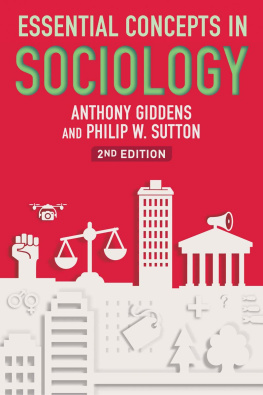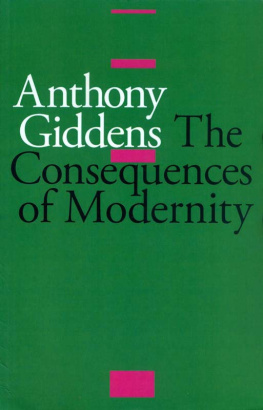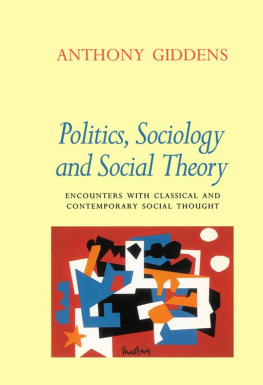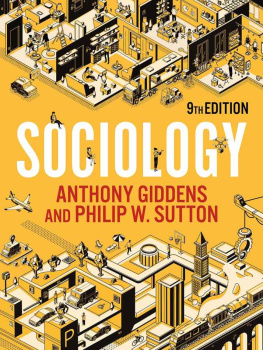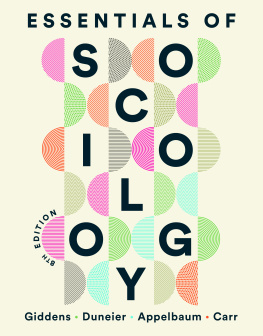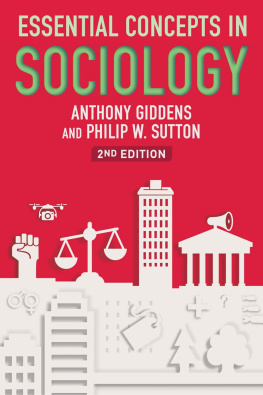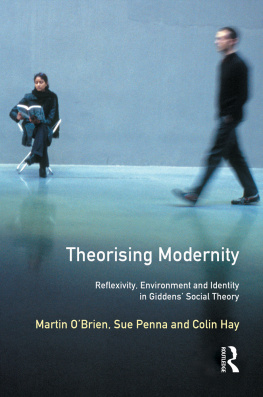Contents
Guide
Pages

Essential Concepts in Sociology
Second Edition
ANTHONY GIDDENS & PHILIP W. SUTTON
polity
Copyright Anthony Giddens & Philip W. Sutton 2017
The right of Anthony Giddens & Philip W. Sutton to be identified as Author of this Work has been asserted in accordance with the UK Copyright, Designs and Patents Act 1988.
First edition published in 2014 by Polity Press
This second edition first published in 2017 by Polity Press
Polity Press
65 Bridge Street
Cambridge CB2 1UR, UK
Polity Press
350 Main Street
Malden, MA 02148, USA
All rights reserved. Except for the quotation of short passages for the purpose of criticism and review, no part of this publication may be reproduced, stored in a retrieval system or transmitted, in any form or by any means, electronic, mechanical, photocopying, recording or otherwise, without the prior permission of the publisher.
ISBN-13: 978-1-5095-1670-4
A catalogue record for this book is available from the British Library.
The publisher has used its best endeavours to ensure that the URLs for external websites referred to in this book are correct and active at the time of going to press. However, the publisher has no responsibility for the websites and can make no guarantee that a site will remain live or that the content is or will remain appropriate.
Every effort has been made to trace all copyright holders, but if any have been inadvertently overlooked the publisher will be pleased to include any necessary credits in any subsequent reprint or edition.
For further information on Polity, visit our website: politybooks.com
Introduction
Social life is never static but is in a constant process of change. Over the last thirty years or so the modern world has been transformed by fluid gender relations, shifting migration patterns, multiculturalism, the digital revolution in communications, the Internet and social media, financial crises, global terrorism and numerous political upheavals. Sociology, originally a product of the nineteenth century, cannot afford to stand still but must move with the times or risk becoming irrelevant. The discipline today is theoretically diverse, covers a very wide range of subjects and draws on a broad array of research methods to make sense of the human world. This is the inevitable outcome of attempts to understand and explain the increasingly globalized environment we are entering, and it means that our familiar concepts need to be reassessed and new ones created. This book includes a mix of both long-established and newly minted concepts.
Concept Development in Sociology
Some sociological concepts are very longstanding and have stood the test of time exceptionally well. Class, status, bureaucracy, capitalism, gender, poverty, family and power, for example, remain fundamental to the business of doing sociology. Others have been developed much more recently. Globalization, postmodernity, reflexivity, environment, life course, restorative justice and the social model of disability all are now part of the conceptual lexicon, representing some of the enormous social changes of recent decades. All of this means that it becomes more difficult to grasp the overall shape of the discipline. The book makes a contribution to this task by introducing some of sociologys essential concepts, many of which act as signposts for particular theoretical developments in sociology over the last 150 years or so. Understanding these essential concepts, their origins and contemporary usage should help readers to see how the subject matter of sociology has developed over time.
Concept development in sociology is usually tied to theories and empirical studies which demand new concepts to make sense of their findings. Some concepts, such as status, class and risk, are already in wide circulation in society but are lifted out of that context into sociology, where they are debated and refined, becoming more precise and useful in the process. Others, including alienation, moral panic and globalization, are specifically created by sociologists to help them study social phenomena but then slip into everyday life, where they influence peoples perceptions of the world in which they live. This is quite unlike the situation in the natural sciences. Regardless of how many concepts from the natural sciences are created, those concepts do not have the potential to change the behaviour of animals and plants. As Giddens has argued, this is an example of a one-way process. In sociology, concepts, research findings and theories do make their way back into society at large, and people may alter their ideas and behaviour as a result. This means that sociological research is part of a continuous two-way process between sociologists and the subjects they study.
This two-way process means that sociological concepts are inherently unstable and open to modification and change, not just within professional sociological discourse but in the social world itself. It also means that some concepts perhaps even a majority are essentially contested. That is, they are used in a variety of theoretical positions and there is no general agreement on their meaning. However, this probably overstates the level of variation and disagreement. In practice, the competing theories in sociology are relatively small in number and conceal the fact that there is more consistency and integration between them than might first appear.
Concepts developed within one theoretical perspective are very often used in others. The concept of alienation, for instance, was originally devised by Karl Marx, enabling him to understand better the nature of work in capitalist societies. Yet it was revived more than a century later, lifted out of its original Marxist theoretical frame and given a new lease of life by industrial sociologists to assess how employees feel about their working environment. In the process, the concept was modified, and, though some Marxists may object, the revised version has given us some very worthwhile insights into how different workplaces and management systems impact on the lives of workers.
The Essential Concepts
We did not set out to produce a comprehensive compendium of sociological concepts. Instead we have carefully selected about seventy concepts that have helped to shape, or are currently shaping, particular fields of inquiry. We have chosen some concepts that have stood the test of time power, class, ideology, society and culture, for example. Concepts such as these have been in use over the entire course of sociologys history, yet they continue to stimulate debate and guide research projects today. Others, such as gender, consumerism, identity and life course, do not have such a long history, but their impact has been significant. Such concepts have not only stimulated large bodies of research but have also reshaped the older debates, forcing sociologists to reassess the value of earlier concepts. Finally we have included some very recent concepts, among them intersectionality, globalization, risk and restorative justice. It is our assessment that these have already generated some innovative research studies and are very likely to become embedded within their specialist fields as essential.
The entries are longer than is usual for a typical key concepts book. Our aim is to give more than just brief definitions. Instead we provide an extended discussion of each concept which sets it into historical and theoretical context, explores its main meanings in use, introduces some relevant criticisms, and points readers to contemporary pieces of research and theorizing which they can read for themselves. This structure enables readers to link the history of sociology with its contemporary form through the development of its concepts. In addition many other concepts are discussed and briefly defined within the entries. Industrialization, for instance, also includes the related concepts of urbanization, post-industrialism and ecological modernization. Hence, readers are advised to use the Index as a guide to locating the many other concepts that are not in the Contents list.

